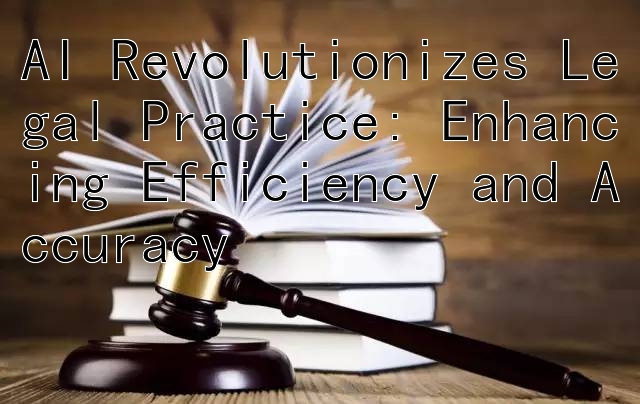AI Revolutionizes Legal Practice: Enhancing Efficiency and Accuracy
导读AI Revolutionizes Legal Practice: Enhancing Efficiency and AccuracyThe advent of artificial intelligence (AI) has revolutionized various industries, i......
AI Revolutionizes Legal Practice: Enhancing Efficiency and Accuracy
The advent of artificial intelligence (AI) has revolutionized various industries, including the legal sector. AI technology is transforming traditional legal practices by bringing efficiency, accuracy, and speed to tasks that were once labor-intensive and time-consuming. This article explores how AI is reshaping the legal landscape, its benefits, challenges, and relevant case studies.
Overview of AI in Law
Artificial Intelligence refers to a machine's ability to perform cognitive functions associated with human minds, such as learning, problem-solving, and pattern recognition. In the context of law, AI is used for tasks like document review, contract analysis, due diligence, eDiscovery, predictive analytics, and even legal research. By automating these processes, AI can significantly reduce costs and improve outcomes for clients and firms alike.
Benefits of AI in Legal Practice
- Enhanced Efficiency: AI algorithms can process vast amounts of data quickly, reducing the time spent on manual tasks. For instance, during eDiscovery, AI can identify relevant documents from large datasets automatically, saving hours of work.
- Improved Accuracy: AI systems are designed to minimize errors through their advanced analytical capabilities. They can spot patterns and connections that humans might overlook, leading to more precise conclusions.
- Cost Reduction: By streamlining operations, AI reduces overhead costs for law firms. Clients also benefit from lower fees because lawyers can handle more cases efficiently without sacrificing quality.
- Accessibility: AI tools democratize access to legal services. Platforms using AI provide self-help resources or connect users with affordable legal advice, bridging the gap between the public and the justice system.
- Continuous Learning: Machine learning algorithms learn from past interactions, making them better at predicting outcomes and providing insights over time. This iterative improvement enhances decision-making within legal proceedings.
Challenges and Ethical Considerations
While AI offers numerous advantages, it also presents certain challenges and ethical considerations. These include:
- Data Privacy: The handling of sensitive client information raises privacy concerns. Firms must ensure robust cybersecurity measures to protect confidential data.
- Job Displacement: Some fear that AI will lead to job displacement among legal professionals. However, many experts believe that AI will create new roles requiring different skill sets rather than eliminating existing ones entirely.
- Bias: AI models can inadvertently perpetuate biases present in training data unless carefully programmed to avoid this issue. It is crucial to develop unbiased algorithms to ensure fairness in legal applications.
- Regulatory Framework: As AI becomes more prevalent in legal practice, there is a need for clear regulations governing its use. Jurisdictions worldwide are grappling with how best to address these emerging technologies within their legal frameworks.
Case Studies
Several examples illustrate how AI is changing the world of law:
Document Review Automation
Law firms have started leveraging AI to automate document reviews during litigation preparation or M&A transactions where thousands of contracts may need examination rapidly yet thoroughly. One notable example is the deployment of an AI platform known as 'Kira Systems' which helped slash processing times while maintaining high standards across hundreds of lease agreements – ultimately freeing up attorneys’ bandwidth so they could focus on higher value activities instead like strategy sessions etcetera thus improving overall productivity levels within those organizations who adopted such innovative solutions early enough before competition caught wind too much about what exactly was happening behind closed doors here!
Predictive Analytics in Litigation Strategy
Another fascinating application lies within predictive analytics which allows attorneys not only predict likely outcomes based upon historical trends but also adjust strategies accordingly thereby increasing chances success rate considerably especially when dealing complex multi-faceted issues involving multiple jurisdictions/laws simultaneously something which would otherwise be extremely difficult if done manually alone without any assistance whatsoever coming way smart machines nowadays capable doing just fine thank goodness indeed ?
In conclusion, AI is poised to transform every aspect of our lives, and the legal profession is no exception. While there are legitimate concerns regarding ethics, job displacement, and bias, the potential benefits of AI in enhancing efficiency and accuracy far outweigh these drawbacks. As long as we approach its implementation thoughtfully and responsibly, AI will continue to shape the future of legal practice positively.
热门标签




















